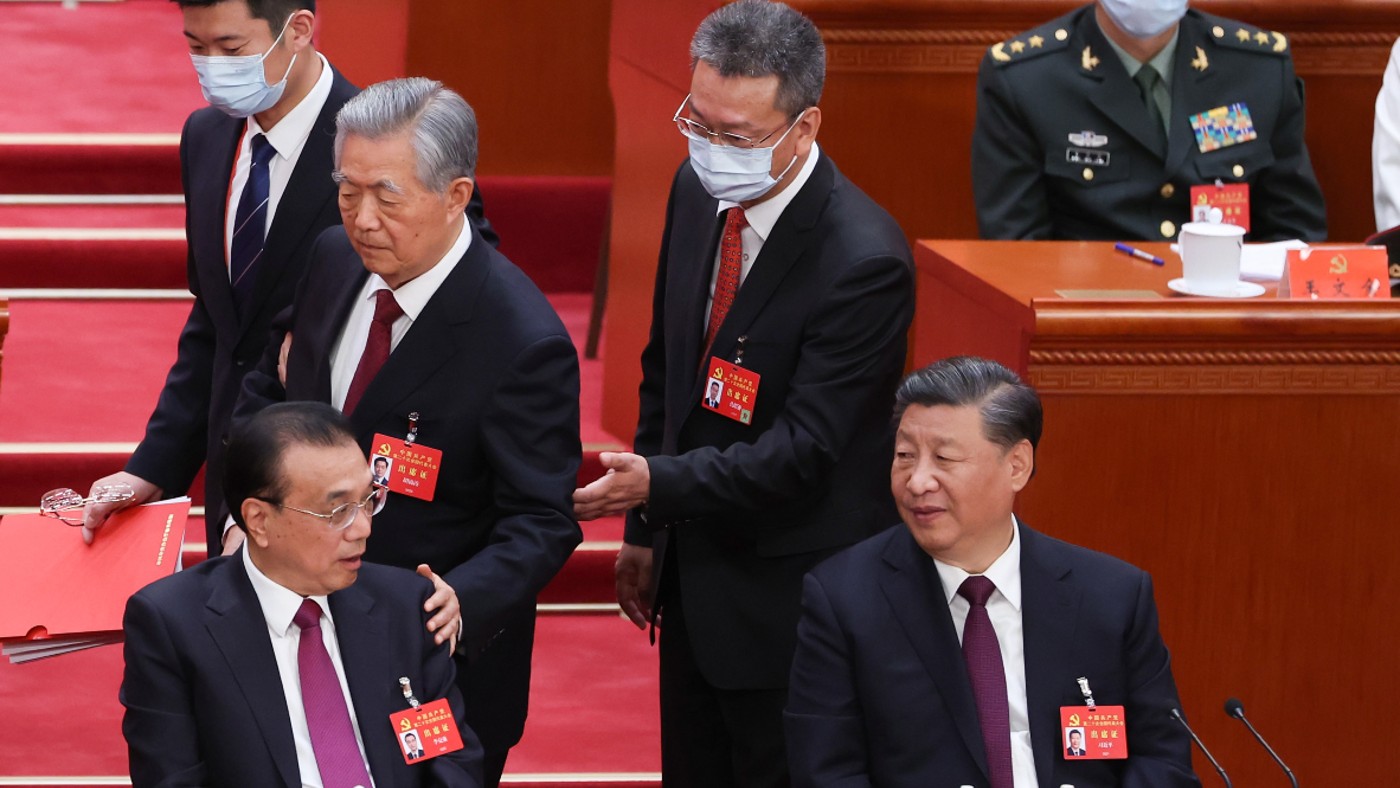The mystery of Hu Jintao’s exit and China’s hidden tensions
Why was Xi Jinping’s predecessor as president ‘firmly escorted’ from last week’s congress?

A free daily email with the biggest news stories of the day – and the best features from TheWeek.com
You are now subscribed
Your newsletter sign-up was successful
A single image from last week’s Chinese Communist Party Congress underlined “the utter ruthlessness of Xi Jinping’s pursuit of absolute power”, said Con Coughlin in The Daily Telegraph. It was the sight of Hu Jintao, Xi’s predecessor as president of China, being “reluctantly but firmly escorted from the closing ceremony”.
Was Hu taken ill, as officials claimed? Or, more likely, was he being humiliated, symbolically purged? Either way, the Congress was “the crowning moment” of Xi’s autocratic rule, as he began a third five-year term. That in itself is unprecedented in recent history: after Mao Zedong died in 1976, a two-term limit was imposed to ensure no leader could repeat his tyranny. But the Party lifted the ban in 2018, allowing Xi to stay in power for life, should he wish to.
And it looks like he does, said Cindy Yu in The Spectator. The new Politburo Standing Committee – the seven-member inner cabinet of Chinese politics – has been “packed with Xi acolytes”. The premier Li Keqiang, Hu’s former protégé, has been demoted after daring to query the cost of Xi’s draconian zero-Covid strategy. His replacement will be the Shanghai party secretary Li Qiang, whose “boneheaded dedication” to China’s lockdowns has recommended him in Xi’s eyes.
The Week
Escape your echo chamber. Get the facts behind the news, plus analysis from multiple perspectives.

Sign up for The Week's Free Newsletters
From our morning news briefing to a weekly Good News Newsletter, get the best of The Week delivered directly to your inbox.
From our morning news briefing to a weekly Good News Newsletter, get the best of The Week delivered directly to your inbox.
Image of total consensus
The Communist Party’s propagandists try to project an image of total consensus, confirming Xi’s “absolute control and unquestioned wisdom”, said Dominic Lawson in The Sunday Times. But there’s a “ferment beneath the carapace of Confucian harmony”.
Great tensions are growing: an estimated 1.4 million people were arrested in the run-up to the Party Congress, to guarantee its “security and stability”. Xi’s zero-Covid policy, which places “entire cities under a form of house arrest”, is widely hated, particularly by young people. The birth rate is steadily declining, despite Xi’s efforts to avert demographic disaster by reversing Mao’s one-child policy.
China is facing “stagnation and deterioration”, said David Von Drehle in The Washington Post. Xi is sitting on a “debt bomb”, and the country’s overheated property sector is in crisis. The workforce is ageing, and the economy is “stalling”: it’s no coincidence that China has abruptly stopped publishing its economic data.
Xi is ‘an old man in a hurry’
All this may only make Xi more dangerous, said Mark Almond in the Daily Mail. Now 69, he’s “an old man in a hurry and determined to leave a lasting legacy of Chinese supremacy”. The obvious flash-point is the “island democracy” of Taiwan, which the US navy thinks Beijing could invade as early as next year.
A free daily email with the biggest news stories of the day – and the best features from TheWeek.com
Whether or not that happens, China’s direction of travel under Xi is clear, said The Observer. His “personality cult” is entrenched, and his speeches at the Congress show that he sees the outside world as an “increasingly hostile” place. “His vision for China suggests more repression at home, more state interference in the economy – and aggression abroad.”
-
 How the FCC’s ‘equal time’ rule works
How the FCC’s ‘equal time’ rule worksIn the Spotlight The law is at the heart of the Colbert-CBS conflict
-
 What is the endgame in the DHS shutdown?
What is the endgame in the DHS shutdown?Today’s Big Question Democrats want to rein in ICE’s immigration crackdown
-
 ‘Poor time management isn’t just an inconvenience’
‘Poor time management isn’t just an inconvenience’Instant Opinion Opinion, comment and editorials of the day
-
 Corruption: The spy sheikh and the president
Corruption: The spy sheikh and the presidentFeature Trump is at the center of another scandal
-
 Putin’s shadow war
Putin’s shadow warFeature The Kremlin is waging a campaign of sabotage and subversion against Ukraine’s allies in the West
-
 The fall of the generals: China’s military purge
The fall of the generals: China’s military purgeIn the Spotlight Xi Jinping’s extraordinary removal of senior general proves that no-one is safe from anti-corruption drive that has investigated millions
-
 Epstein files topple law CEO, roil UK government
Epstein files topple law CEO, roil UK governmentSpeed Read Peter Mandelson, Britain’s former ambassador to the US, is caught up in the scandal
-
 Iran and US prepare to meet after skirmishes
Iran and US prepare to meet after skirmishesSpeed Read The incident comes amid heightened tensions in the Middle East
-
 Syria’s Kurds: abandoned by their US ally
Syria’s Kurds: abandoned by their US allyTalking Point Ahmed al-Sharaa’s lightning offensive against Syrian Kurdistan belies his promise to respect the country’s ethnic minorities
-
 Israel retrieves final hostage’s body from Gaza
Israel retrieves final hostage’s body from GazaSpeed Read The 24-year-old police officer was killed during the initial Hamas attack
-
 China’s Xi targets top general in growing purge
China’s Xi targets top general in growing purgeSpeed Read Zhang Youxia is being investigated over ‘grave violations’ of the law